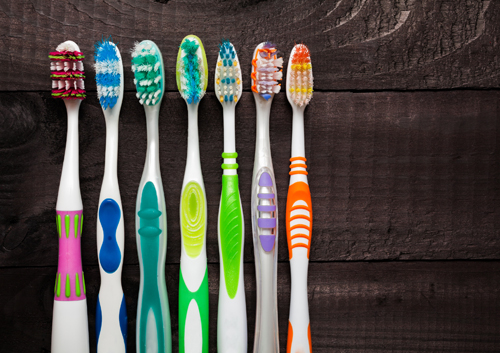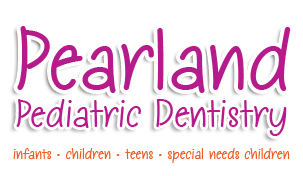January 8th, 2025

If you were to put your toothbrush bristles under a high-powered microscope, what you would see might give you nightmares: millions of bacteria, busily crawling up and down your toothbrush bristles, consuming proteins that came from your mouth, and still clinging to the bristles even after you’ve rinsed them with water.
Rinsing your toothbrush after brushing removes some of those ferociously hungry bacteria, but not all. The American Dental Association says that bacterial infestations develop on toothbrushes within a month of daily use. The ADA also states that unless a toothbrush is sterilized before being packaged, it’s going to come with bacteria – free of charge!
Germs and Frayed Bristles: the Demise of a Toothbrush
Dr. Pamela Clark and our staff recommend that you toss your old toothbrush in the trash and purchase a new one every three months. Children tend to bite on their toothbrushes, which makes the bristles degrade and fray faster. Chances are kids may need to have their toothbrushes changed more frequently.
Where do they hide?
Bacteria are tenacious little germs that head for those concealed areas between toothbrush bristles. They are highly adaptable and exist in every type of extreme environment. Some people actually go so far as to put their toothbrush in a microwave for a few seconds to kill germs, but this doesn't always work either. In fact, you may only end up with a toothbrush that’s as bendable as a Gumby doll – and still covered with germs.
Feed a Cold, Starve a Fever, and Get Rid of Your Toothbrush
When you have a head cold, your mouth is teeming with bacteria gleefully roaming around, and gobbling mucus and dead skin cells. If you brush your teeth while suffering a sinus condition, the brush will act like a magnet for ravenous bacteria. Use your old toothbrush while you are sick, but as soon as you feel better, throw it away and get a new one. Otherwise you could possibly re-infect yourself with the same cold germs!
January 8th, 2025

Dr. Pamela Clark and our team know it can be easy to underestimate the significance of baby teeth. At Pearland Pediatric Dentistry, we sometimes meet parents who assume that since their child's baby teeth, also known as primary teeth, eventually fall out and are replaced, they are less important. But did you know baby teeth serve purposes other than biting, chewing, and digesting food properly?
Baby teeth are essential not only for your child’s language development, but they also serve other important functions, like contributing to the normal development of your child’s jaw bones and facial muscles. Baby teeth also reserve space for your child’s future permanent teeth.
So, when do baby teeth fall out?
A baby tooth is intended to remain in your child’s mouth until the permanent tooth underneath it is ready to take its place. Sometimes, either due to a tooth being knocked out accidentally or being removed because of tooth decay, kids lose baby teeth before the permanent teeth are ready to erupt. If a tooth is lost, the teeth on either side of the open space may possibly push into the open space. The result? There may not be enough room for the permanent tooth when it is finally ready to erupt.
If you have any questions about your toddler’s teeth, or if your child is experiencing issues that concern you, please give us a call to set up an appointment at our convenient Pearland, TX office.
January 1st, 2025

Brushing your teeth regularly is one of the most crucial parts of maintaining good oral health, and perhaps the most fundamental, however, there are also other elements involved. Flossing, for instance, is also vital; some experts would say, and Dr. Pamela Clark and our team would agree, that it holds just as much importance as brushing your teeth. To give you a better idea of why, here are some reasons that flossing is so vital to your oral health.
Getting in-between the Teeth
While brushing your teeth effectively cleans all of the areas of your teeth that are visible, or otherwise not touching, flossing is vital because it reaches all of the areas between your teeth that you cannot see, and subsequently cannot clean using a toothbrush. These areas are among the most sensitive and vulnerable parts of your mouth because they are most susceptible to plaque and tartar buildup.
Reducing Bad Breath
It is not uncommon for someone who brushes their teeth once or twice a day to still have bad breath. The reason being is that bad breath is often created by smelly bacteria that lives in between your teeth, as well as other areas of your mouth that are not accessible using a toothbrush. And that is why flossing is one of the best ways to reduce or eliminate bad breath. Still skeptical? Try flossing your teeth with unscented floss, then smell it after, that awful scent is the source of your bad breath. Coupled with frequent brushing of your teeth, you will find that flossing can really help that stinky breath.
Brushing your teeth twice a day is hard enough, add flossing on top and it can be difficult to establish a regular habit. However, doing so is totally worth it; just look at the aforementioned reasons why. Use these for motivation the next time you don’t feel like flossing, and let us know if it worked at your next visit to our Pearland, TX office.
December 25th, 2024

Have you ever watched to see if your child is breathing through his or her mouth? Breathing through the mouth instead of the nose may lead to trouble for youngsters. Kids who typically breathe through their mouth—most often children who suffer from allergies—experience problems getting enough oxygen into their blood, a condition that affects their weight, size, sleep, and even their performance in the classroom and daily life.
Mouth breathing as a child can also lead to sleep apnea, behavior and learning problems, delayed speech, dental and facial abnormalities, and even breathing problems as your child grows. There are a multitude of reasons for an individual to mouth breathe, such as enlarged tonsils, adenoids, and deviated nasal septum, but the cause is usually allergies.
As bad as the condition sounds, we want you to know mouth breathing is a treatable condition. Doing so, though, requires early diagnosis and treatment. Since our team at Pearland Pediatric Dentistry sees our patients every six months, we may be in a position to identify the symptoms of mouth breathing.
If you suspect your child is a chronic mouth breather, please give us a call at our convenient Pearland, TX office to schedule an appointment with Dr. Pamela Clark.








